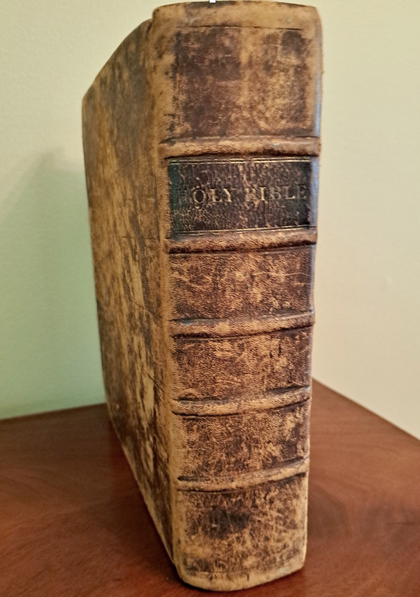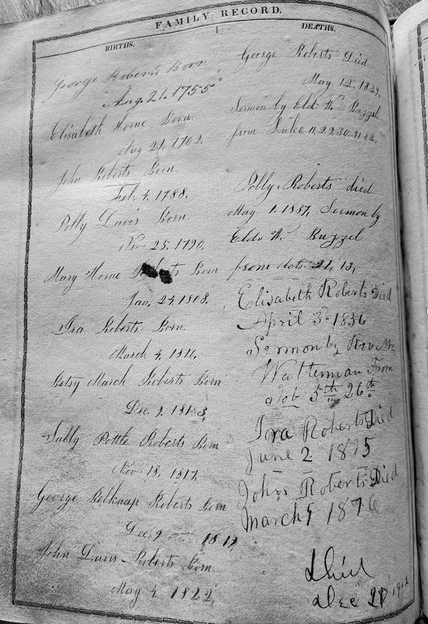Welcome to the WBHS's newest page that will be periodically updated to highlight some of the items in our collection that include documents, textiles, books and artifacts.
THE ROBERTS FAMILY BIBLE
By Jennifer Rich
This Bible is of special importance to me because my husband is a direct descendant of Thomas Roberts, who came to Dover, New Hampshire with the Hiltons in 1623, as is the family who owned this Bible. The Roberts family of Milton, New Hampshire donated this family heirloom to the Society in 1957. It is a typical family Bible of the 19th century, published by J. Holbrook of Brattleborough, Vermont in 1818. In the center of the scriptures is a beautifully handwritten list of births and deaths within the family, starting with George Roberts, born on August 21, 1755.
As was typical of that time, the bible also stores within its pages items that were of special importance to the family. In this case, the most interesting is a pamphlet written by Charles H. Roberts regarding the background of George Roberts, Revolutionary War sailor, who served under John Paul Jones on the Ranger and the Bonhomme Richard. There is a belief that George was the true hero of the Battle of Flamborough Head between the Bonhomme Richard, which had just been given to the American cause by the French, and the much better armed British ship HMS Serapis. The two fought for over four hours with both sides losing nearly half of their crew. The Captain of the Serapis called for John Paul Jones to surrender, and Jones replied with his now famous words, “Sir, I have not yet begun to fight.” As the fight continued, Jones was able to lash the two ships together. A sailor swung over the Serapis on a yardarm and dropped grenades into its holds, exploding the arms magazines. This forced the Serapis to surrender, despite the fact that the Bonhomme Richard was so damaged that it would soon sink. Revolutionary War scholars consider this to be the most important sea battle of the whole war. In the pamphlet, an eyewitness to this event says that courageous sailor was George Roberts. The pamphlet also contains other of his war experiences and genealogical information regarding the Roberts family.
After the war and a time of living in Dover to continue his life at sea, George retired to Middleton, New Hampshire (which was at that time combined with Brookfield) and lived out his days as a farmer, first in a cabin near Moose Mountain, then in a small farm on the Stage Road between Dover and Wolfeboro. His grave is there on the family farm with the inscription:
George Roberts
Died
May 12, 1829
A soldier in the Revolution
By Jennifer Rich
This Bible is of special importance to me because my husband is a direct descendant of Thomas Roberts, who came to Dover, New Hampshire with the Hiltons in 1623, as is the family who owned this Bible. The Roberts family of Milton, New Hampshire donated this family heirloom to the Society in 1957. It is a typical family Bible of the 19th century, published by J. Holbrook of Brattleborough, Vermont in 1818. In the center of the scriptures is a beautifully handwritten list of births and deaths within the family, starting with George Roberts, born on August 21, 1755.
As was typical of that time, the bible also stores within its pages items that were of special importance to the family. In this case, the most interesting is a pamphlet written by Charles H. Roberts regarding the background of George Roberts, Revolutionary War sailor, who served under John Paul Jones on the Ranger and the Bonhomme Richard. There is a belief that George was the true hero of the Battle of Flamborough Head between the Bonhomme Richard, which had just been given to the American cause by the French, and the much better armed British ship HMS Serapis. The two fought for over four hours with both sides losing nearly half of their crew. The Captain of the Serapis called for John Paul Jones to surrender, and Jones replied with his now famous words, “Sir, I have not yet begun to fight.” As the fight continued, Jones was able to lash the two ships together. A sailor swung over the Serapis on a yardarm and dropped grenades into its holds, exploding the arms magazines. This forced the Serapis to surrender, despite the fact that the Bonhomme Richard was so damaged that it would soon sink. Revolutionary War scholars consider this to be the most important sea battle of the whole war. In the pamphlet, an eyewitness to this event says that courageous sailor was George Roberts. The pamphlet also contains other of his war experiences and genealogical information regarding the Roberts family.
After the war and a time of living in Dover to continue his life at sea, George retired to Middleton, New Hampshire (which was at that time combined with Brookfield) and lived out his days as a farmer, first in a cabin near Moose Mountain, then in a small farm on the Stage Road between Dover and Wolfeboro. His grave is there on the family farm with the inscription:
George Roberts
Died
May 12, 1829
- E. 73 y’rs, 8 mo.
A soldier in the Revolution

